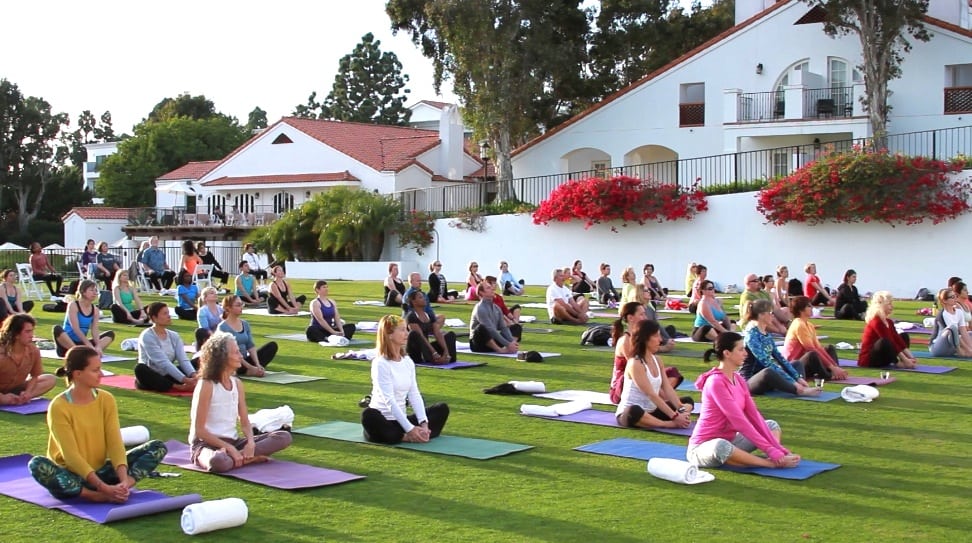Skift Take
There's no longer a one-size-fits-all method to meetings. Smart hotels are looking to new ideas -- even if they're very old ideas like yoga -- to offer better options for planners and guests.
Earlier this week we released our new report, “The Future of Meetings in Hospitality,” which examines the evolution of the meetings industry, specifically through the lense of hospitality. This is the most definitive report on where the meetings and conferences industry is going, especially as a result of all the technology changes. Get the report for a deep dive.
Founded by wellness guru Dr. Deepak Chopra, The Chopra Center is part of the Omni La Costa Resort & Spa in Carlsbad, California.
In 2013, the Center unveiled a Workplace Wellness series of programs for business people to learn how to be healthier both at work and in their personal lives. It was launched due to growing demand from meeting planners who wanted to incorporate the teachings of Dr. Chopra into their events.
“More than anything I’m seeing that the traditional meetings we’ve always had, whether it’s a sales kickoff meeting, or an investment meeting or an incentive program, is that planners are adding in a wellness component,” says Patsy Bock, director of sales & marketing at Omni La Costa. “That’s the new piece in the industry.”
Companies such as Merrill Lynch, Bank of America and IBM have all participated in the Workplace Wellness programs, which revolve around three pillars:
- Meditation: For quieting the mind, using silence as the source for creativity and inspiration
- Yoga: For physical movement and spiritual connection
- Ayurveda: The 5,000-year-old healing philosophy from India provides preventative lifestyle tools to navigate modern living in a balanced way
“Usually meeting planners will have an afternoon free and they’re looking for some type of teambuilding event,” says Bock. “And to be able to say, we have a program that we’ve partnered with Chopra on, they’re automatically interested. Because their executives are used to having their iPhone and their email and everything else at their fingertips, and never taking a break. So, how do we step back and learn how to incorporate being mindful of our health and our time?”
Bock says the most profound takeaways she’s seen among herself, her team and the groups who have participated in Workplace Wellness is the realization about just how messed up our daily routines are.
“We’ve had a few people who say the stress in their job is making them physically sick,” she explains. “So this is life transforming, it will change the quality of your life. The value of this is for those people who are absolutely glued to their cell phones. They can’t unwind when they get home from work, and they’re not really present when they’re having dinner with their family.”
Awareness of all this is becoming mainstream. Bock says back in the 1990s, people used to brag about how many hours they worked. Today, people brag about how little they work, and how much time they can spend with their family and spouse.
Sara Harvey, COO of the Chopra Center, promotes the need to address wellness holistically. She says, “For the past 20 years, the Chopra Center has recognized the integration between mind, body and spirit, and provided wellness programs that are targeted specifically to address the whole person on all levels.”
From an individual perspective, group participants feel rejuvenated. The business case for the meeting planner is that everyone in the group feels reconnected to each other.
“Most of the corporate folks who come to us come a little skeptical, like, what is this stuff?” she says. “But by the end, meditation is one of the things they truly feel transformed about, because there’s so much noise going on in our heads at any given time. So to be able to literally take 15 or 30 minutes and quiet those thoughts down, and allow what’s already there—creativity and inspiration—to rise up, is life altering in the most simple of ways.”
Our second trends report for March dives deep into how hospitality brands are remaking the modern meeting.
“The Future of Meetings in Hospitality” looks at how wildly popular events such as the annual TED Conference, South by Southwest in Austin, and Oracle’s OpenWorld in San Francisco are beginning to influence the traditional meetings industry.
Have a confidential tip for Skift? Get in touch
Tags: conventions, health, meetings, meetings and events
Photo credit: The Chopra Center is part of the Omni La Costa Resort & Spa in Carlsbad, California. Omni Hotels
